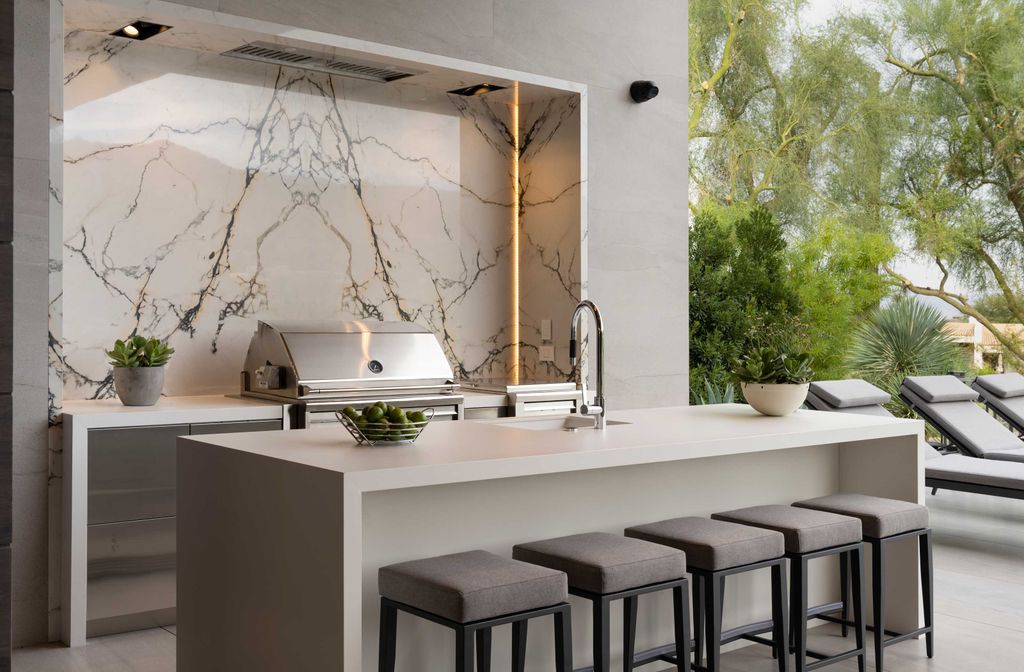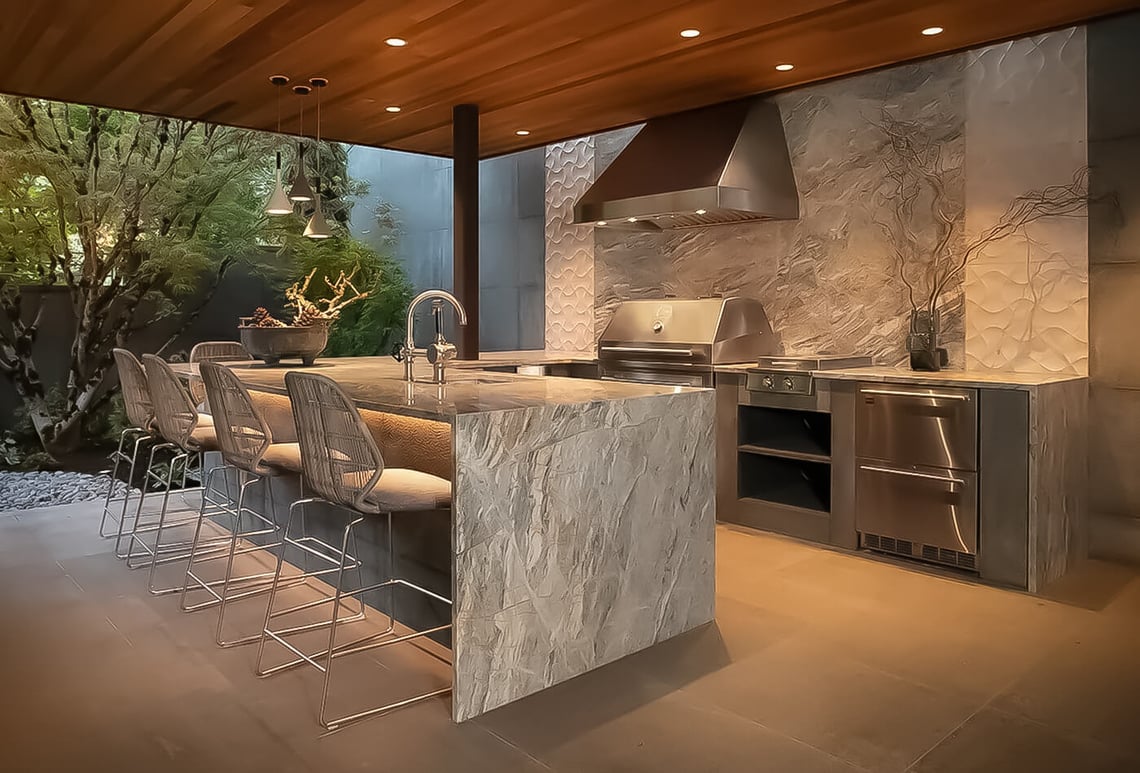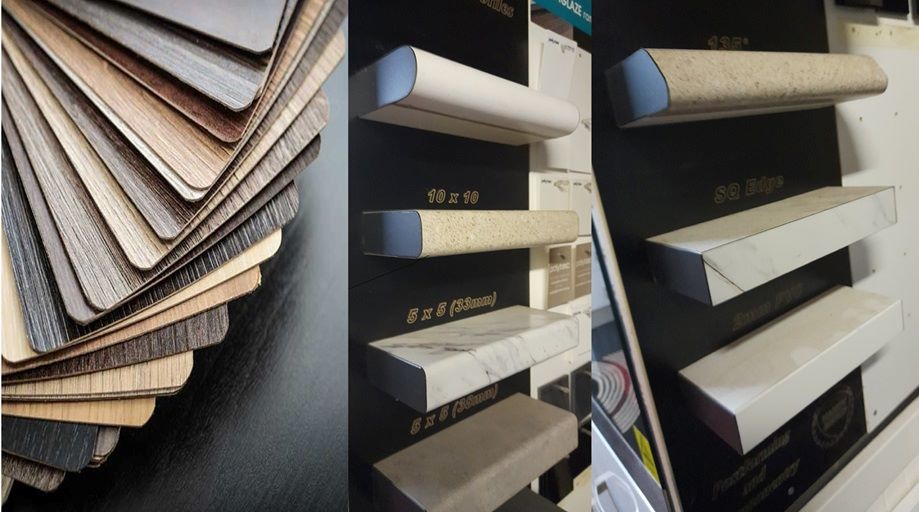Table of Contents
ToggleOutdoor kitchens are not just a luxury anymore – they represent an integral part of modern living, offering that ideal spot for entertaining, relaxing, and cooking outdoors. Indoor and outdoor spaces are steadily becoming blurred, but with the added risk of the sun, rain, heat, and accidental spills constantly threatening your surfaces, selecting the best stone for outdoor kitchens is not just about aesthetic appeal – it’s about durability, maintenance, and making a long-term investment. If you’re in Melbourne, the local climate can be unforgiving, thus it’s extremely important to select a stone that can withstand fading, cracking, and staining.
In this article, we’ll identify and provide an overview of the best stone options that embody style and strength, equipping you to make a decision that is both aesthetically pleasing and practically pragmatic. Let’s get started and find out which stone is right for you and your outdoor kitchen!
Key Factors When Choosing Stone for Outdoor Kitchens
When figuring out your dream outdoor kitchen, choosing the best stone for outdoor kitchens isn’t just about looks, it’s about finding a material that is durable, resilient to daily use, harsh outdoor conditions all while looking lovely for years to come. To make the best choice for your Melbourne outdoor speakers, you will be considering all of these factors with emphasis on durability, style and budget. You want your outdoor space to be practical but comforting and inviting as well, so take a look at the key factors below before you decide:
- Strength & Durability: Choose stones that will be resistant to heat, scratches, and significant use so that your outdoor kitchen is strong and substantial.
- Maintenance: Choose stones that are easy to keep clean, and require little maintenance. This is especially important in the outdoor atmosphere where messes happen quickly with spills and stains.
- Resistance to the elements: The stone should be able to handle the variety of weather conditions Melbourne has including, UV, rain, frost and humidity.
- Looks: The colors and textures you choose should suit the quality of your outdoor design in order to create a cohesive look in your outdoor kitchen.
- Budget: Look at the initial costs, but also look for the value over time. You should choose a stone that looks elegant, and is durable without breaking the bank.
Best Stones for Outdoor Kitchens
When it comes to selecting a stone, the best one for outdoor kitchens balances durability, aesthetics, and your budget. Each stone type has its own advantages and disadvantages, which is why it’s important to understand what is practical for your particular outdoor living style in Melbourne.
Granite
Granite continues to be, arguably, the best option for outdoor kitchens due to its reliability and popularity.
- Pros: Extremely durable in almost all environments, heat resistant, comes in a full rainbow of colors and patterns.
- Cons: Naturally porous, and must be sealed regularly to prevent staining.
Quartzite
With its superior durability and elegant appearance, quartzite is the most luxurious outdoor stone.
- Pros: Incredibly durable, heat and scratch resistant, a natural stone look with UV resistance.
- Cons: Pricier than granite, especially because it’s best just to hire a professional for the sealing.
Concrete
Concrete is a solution for those who want unlimited creativity in shaping an outdoor kitchen!
- Pros: It can be molded and colored to match any type of design, heat resistant, and can be used for countertops or surrounds.
- Cons: Can crack overtime, should be sealed to protect it from stains and moisture.
Slate
Slate has a nice rustic texture and a slip-resistant quality that’s ideal for outdoor uses!
- Pros: Natural texture, slip-resistant finish, and relatively low maintenance when compared to other natural stones.
- Cons: Slate surfaces can chip or scratch if a heavy object falls; the quality can vary by slab.
Marble
Marble is the most luxurious outdoor choice for people who value elegance and aesthetics!
- Pros: Timeless with a smooth surface, and adds the most luxurious appearance.
- Cons: Marble is porous, more prone to stains and etches, and less durable outdoors compared to other options without regular care.
Challenges of Using Granite for Outdoor Benchtops
Granite is frequently recommended as one of the best stones for outdoor kitchens. However, like all materials, granite has three main issues that need to be addressed by homeowners before installing granite. Those issues need to be understood if you want to properly plan for care and maintenance in order to maximize the life of the granite.
- Maintenance: Granite is a more durable surface than marble when it comes to receiving damage from moisture. Still, granite needs to be resealed periodically to minimize moisture absorption and stains. If you continue to keep up with the maintenance, granite will still be a great surface for years to come– outdoors.
- Weight: Granite is a very dense stone. As a result, it must be supported by a solid and possibly reinforced surface. If the stone is not properly supported, it can lead to unwanted movement. This is why it is very important to have the granite installed professionally for durability in the long run.
So, even with three main issues with granite, if you are looking for an outdoor kitchen benchtop material that will hold up to the elements for an extended period of time while minimizing corrosion, granite is one of the best options for your home!
Maintenance Tips for Outdoor Stone Surfaces
Maintaining your outdoor kitchen doesn’t simply come down to choosing the best stone for outdoor kitchens—it truly depends on your maintenance routines. By following a regular ongoing maintenance program, you will maintain the appearance, strength, and life of your stone surfaces, even under Melbourne’s ever-changing weather. Here are some tips to ensure your stone surfaces remain as natural stone should:
- Maintenance Cleaning with Gentle Soap Range: Make sure to clean your surfaces with warm water and a mildly soapy substance to remove dirt, grease, food spills, etc. and doing so will not damage the stone in any way.
- Sealing Periodically with a good quality sealer: Use commercially available sealers and as regularly as suggested to protect your surfaces from stains, moisture, and damage caused by weather. If used as recommended by manufacturers, good quality sealers will prolong the life of your stone surfaces.
- Using Non-Abrasive Cleaners: Do not use cleaners that contain acid or abrasives as these can etch, remove colour, or weaken the surface of natural stone.
- Using Cutting Boards and Trivets: Avoid cutting food directly onto stone surfaces with sharp knives, and avoid placing hot cookware directly onto the stone to prevent scratches and chips.
Frequently Asked Questions (FAQs)
Which natural stone is best for outdoor countertops?
Granite and quartzite are generally considered the best natural stones for outdoor countertops because they are highly durable, heat-resistant, and able to withstand weather changes with minimal issues.
Is marble durable enough for outdoor benchtops?
Marble can be used outdoors, but it is porous and more prone to staining, etching, and weather damage. It requires frequent sealing and maintenance, making it less practical than granite or quartzite.
Do outdoor natural stone countertops need maintenance?
Yes. Even the most durable stones need periodic sealing, regular cleaning, and protection from harsh chemicals to maintain their look and longevity.
Can porcelain slabs be used for outdoor countertops?
Absolutely. Porcelain slabs are non-porous, UV-resistant, and very low-maintenance, making them an excellent alternative to natural stone for outdoor kitchens.
How do I protect my outdoor stone benchtop from harsh weather?
Apply a high-quality sealant regularly, use protective covers when not in use, and avoid leaving acidic or staining substances on the surface to prevent long-term damage.
The decision of which stone to use in your outdoor kitchen comes down to variety of factors such as durability, design or aesthetic appeal, and maintenance expectations. Granite, and quartzite are the most practical solution, whereas other stones such as concrete, slate, and marble better serve prospective outdoor kitchens based on particular design appeals. Historically, the best overall relationship is stone in an outdoor kitchen based on your design preferences, style, and budget of stone which will fit with your outdoor experience and our unique climate in Melbourne. If you would like more suitable advice and a high quality selection of the best stones for your outdoor kitchen, visit EmporiumStone Melbourne and we will help you create your suitable outdoor kitchen design with the successful addition of a great stone that will withstand the test of time.



